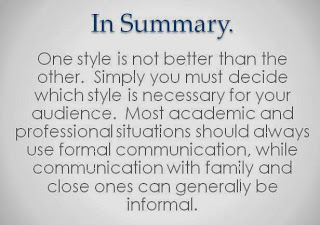Friday, October 25, 2013
Monday, April 29, 2013
Providing Details and Examples (Mariam Kushkaki)
Two types of details and specific examples you can
provide to support your ideas:
1. _______________Personal__________________
a. Stories
(relatives, friends, acquaintances)
b. Experiences
(your own)
c. Descriptions
(people, places, and events)
2. _____________Outside
Sources______________
a. Facts/Statistics
b. Descriptions
(people, places, and events)
How can we be specific when providing personal examples? Look for places
where you can add details that answer the 5 Ws:
Who: My
brother Tom and I went to the store.
When: She went for a drive one winter night to clear her head.
What:
Peter woke up and looked out the
window.
Where: Alex’s car broke down on the 5 freeway.
Why: I always check the locks on my windows
before I leave because I live on the
first floor and am afraid someone will break in.
Let’s practice writing specific examples and details:
1.
Imagine
that you and your friend went out for dinner at a restaurant, and it was a good
experience. Now, you’re writing a review on Yelp, and you give several reasons
for why people should go to this restaurant. Support each of the reasons below
with 2-3 sentences that have specific details (you may use the 5 Ws).
First reason: The restaurant
looked very nice. (Support this with DESCRIPTIONS.)
Second reason: The
service was wonderful. (Support this with YOUR EXPERIENCE.)
Third reason: The food
always tastes delicious every time we come here. (Support this with a STORY.)
2.
Imagine
that you work as a server in a restaurant, and somebody asks you to describe
your job. You say you don’t really like your job, and you explain why. Support
the following reasons with 2-3 sentences:
First
reason: The customers are rude.
Second
reason: My boss doesn’t treat the employees fairly.
Third
reason: The hours I work are unreasonable.
Now, let’s write a sample paragraph
using outside sources. Below is an excerpt from an article titled “What Rights
Should Illegal Immigrants Have?” by David Bennion:
Many students graduate from U.S. high schools with
undocumented status—that is, they are not legally permitted to reside in the
United States. Many of them were brought to the United States as young children
and have lived in America for most of their lives. Once they graduate from high
school, there are few opportunities for them as they lack access to in-state
college tuition or the legal ability to work. The Development, Relief, and
Education for Alien Minors Act, or DREAM Act, would change this, offering
undocumented youth the chance at legal resident status. These youths, or
Dreamers, should be allowed to have the chance to stay in the country they call
home.
…
Each year, about
65,000 undocumented students graduate from high school in the United States.
They then face often insurmountable barriers to pursuing further education or
employment opportunities. Many colleges and universities will not permit them
to enroll. Even if they are admitted, most financial aid is not available to
them. In most states, they will pay prohibitively expensive out-of-state
tuition rates, regardless of how long they have lived in the state.
Using quotes from the article,
write a paragraph that explains why the DREAM Act should be passed. Give two
reasons to support your position. For each reason, give one personal example
and one example from the article (use quotes). If you run out of time during
the workshop, you can always complete the paragraph at home and then bring it
back to the lab and have a tutor look it over.
Subscribe to:
Comments (Atom)


















































